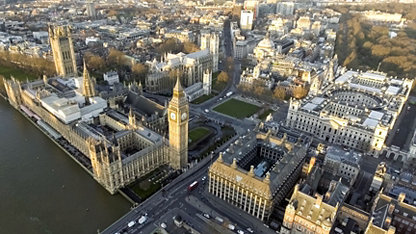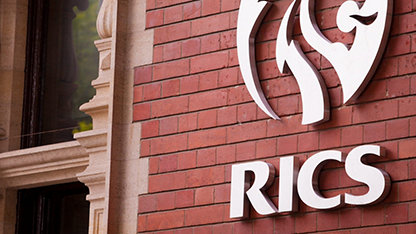Commercial real estate plays a fundamental role in fuelling economic growth, creating jobs and supporting communities. These properties are not just buildings; they are essential, diverse spaces where businesses, from shops and offices to factories, operate and thrive. The RICS 2022 Commercial Real Estate Impact Report illustrates that commercial real estate directly generates £66bn in GVA, over £15bn in tax revenues and employees more than 1 million people. For every £1 spent, the sector delivers a positive return of £0.91 in GVA.[1]
Yet the sector faces unprecedented change. The new government and industry must collaborate effectively and efficiently from day one to benefit people, businesses, communities, and society across the UK.
Below is the Royal Institution of Chartered Surveyors (RICS) response to the political parties' manifestos and plans, examining the known positions of the Conservative, Labour, and Liberal Democrats parties on business rates, high streets and regeneration through the lens of property. This article offers an overview, but these policies form just a small part of the commercial real estate sphere and as always, the devil is in the detail.
Business Rates
Business rates have a crucial role for funding local services, ensuring community development whilst shaping local economic areas. It is widely recognised that business rates are too high, too complex and too burdensome, suppressing growth and discouraging investment.
Conservative Party Manifesto - Business Rates
- We are supporting firms with a business rates support package worth £4.3 billion over the next five years to support small businesses and the high street.
- Continue to ease the burden of business rates for high street, leisure and hospitality businesses by increasing the multiplier on distribution warehouses that support online shopping over time.
- Create more Freeports and Business Rates Retention zones. Freeports have already generated just under £3 billion in investment, which in turn will create thousands of jobs. We will extend this opportunity to more areas and set out an application round in the next Parliament. We want to replicate the example of Sunderland’s Crown Works Studios elsewhere in the country. We will enable councils to retain all business rates growth within a defined zone for 25 years, which they can use to finance the delivery of new infrastructure and invest in supporting burgeoning local industries.
Labour Party Manifesto – Business Rates
- The current business rates system disincentivises investment, creates uncertainty and places an undue burden on our high streets. In England, Labour will replace the business rates system, so we can raise the same revenue but in a fairer way. This new system will level the playing field between the high street and online giants, better incentivise investment, tackle empty properties and support entrepreneurship.
Liberal Democrats Manifesto – Business Rates
- Boost small businesses and empower them to create new local jobs, including by abolishing business rates and replacing them with a Commercial Landowner Levy to help our high streets.
RICS response and position – Business Rates
While the political parties offer different approaches, they share a common goal of reforming business rates to alleviate burdens on businesses and stimulate economic growth. The scale of this reform does differ from evolution to revolution, and the details and shape of how this looks post general election will be crucial. RICS's recommendations on business rates can be found in more detail below:
Meaningful reform of the business rates system
- Lower the level of business rates in comparison to other taxation and relative local taxation systems in competing markets globally, whilst creating fairer funding for local services.
- Reduce complexity. Replace a policy of amendments to reliefs with wider wholesale reform.
- Provide full transparency to ratepayers about how their valuations are calculated and the evidence supporting this.
Reduce the burden of business rates administration
- Improvement of IT and digital services provided by government, sensitive to the needs of ratepayers and those administering business rates. Proportionate administration of information and other requirements on ratepayers and the efficient use of gathered data across government.
Support the valuation and administration of business rates
- Appropriate resourcing of the Valuation Office Agency (VOA) and billing authorities.
Improve professionalism in business rates services
- Raise awareness of “rogue agents” who are not members of professional bodies and present a risk to small business operators. Encourage the use of regulated professionals to protect ratepayers. Promote business rates advice from qualified members of RICS, RSA and IRRV who must operate in accordance with the Rating Consultancy Code of Practice
Incentivise sustainable investment
- Understand net-zero transition and how the business rates relief, empty property and wider business rates system could be amended to better allow for sustainable investment. Make sure that this applies not just to green energy generation reliefs but to sustainable transition more widely.
High Streets and wider regeneration
Chartered surveyors play a fundamental role on high streets, they offer comprehensive support across various aspects of planning, design, development and management. They engage in strategic planning, collaborating with local authorities and stakeholders to devise tailored regeneration plans that align with community needs and urban development objectives. Utilising their design expertise, surveyors ensure that high street spaces are not only aesthetically pleasing but also functional and accessible. They conduct valuations to assess the economic viability of regeneration projects and provide guidance on investment opportunities, ensuring that resources are allocated effectively for long-term economic and environmental sustainability. Additionally, surveyors provide expert rating advice, helping businesses navigate complex business rates regulations and ensuring fair assessment, which is crucial for their financial stability. Surveyors oversee safety standards, conducting thorough assessments to ensure compliance with regulations and mitigate risks. They also play a pivotal role in property maintenance, devising tailored maintenance plans and overseeing their execution to uphold the integrity and appeal of high street properties. Surveyors manage leases, facilitating agreements between property owners and tenants to optimise occupancy and support diverse business activities. Through their multifaceted expertise, chartered surveyors cover all aspects of high street regeneration, contributing to the creation of vibrant, sustainable and resilient environments.
To effectively tackle the challenges that high streets face, there is a need to reimage and reanalyse the impact and role of both national and local government, as well as, the purpose, size and function of high streets. There is a need for a heightened national ambition and focus on commercial property, we need to unlock more investment, drive forward more bottom-up community initiatives, explore the opportunities and impact of sustainability, reform business rates and create policies promoting healthy user focussed buildings.
Conservative Party Manifesto - High Streets and wider regeneration
- Provide 105 towns in the UK with a £20 million endowment fund for local people to change their town’s future. This includes extending our plan to 30 more towns who will benefit from funding that they can use on their priorities such as reviving high streets or bringing new housing to town centres.
- Extend our Community Ownership Fund to help more communities across the UK take control of vital community assets like pubs, music venues, libraries, green spaces, leisure centres and more.
- Extend the UK Shared Prosperity Fund for three years at the next Spending Review, before using this funding to support UK wide National Service. Both schemes will involve funding community groups focused on increasing life chances, instilling civic pride and boosting people’s skills.
- Continue backing Investment Zones across the country, giving areas £160 million to catalyse local growth and investment
- Give our high streets a new lease of life and restore pride in place. We will change planning laws to support places to bring back local market days and regenerate defunct shopping centres. We will continue to make industry pay for removing chewing-gum from streets and raise the fines utility firms must pay when they create ‘street scars’ by not properly restoring roads and pavements after their works are completed.
- Business rates alterations (as mentioned above)
Labour Party - High Streets and wider regeneration
- Revamp empty shops, pubs and community spaces. People won’t visit high streets blighted by unsightly boarded up shops. Labour will give communities a strong new ‘right to buy’ beloved community assets to revamp high streets and end the blight of empty premises.
- In partnership with local leaders and communities, a Labour government will build a new generation of new towns, inspired by the proud legacy of the 1945 Labour government. Alongside urban extensions and regeneration projects, these will form part of a series of large-scale new communities across England.
- Business rates alterations (as mentioned above)
Lib Dems – High Streets and wider regeneration
- We will support entrepreneurs, back small businesses, and reform business rates to help our high streets. Our town centres and high streets are crying out for a fair business rates system.
RICS response and position – High Streets and wider regeneration
The political parties share a commitment to revitalising high streets, albeit through slightly different approaches. The Conservatives focus on improving business rates and wider regulatory changes. Labour aims for a structural overhaul of the business rates system, empowering community revamps, and large-scale urban regeneration. The Liberal Democrats emphasise support for small businesses and entrepreneurs, whilst replacing business rates with a Commercial Landowner Levy. These generally align with RICS’s advocacy for sustainable investment, reduced administrative burdens, and transparent for fair funding mechanisms, ultimately contributing to vibrant and thriving high streets. Later this year RICS plan to publish our Parliamentary Briefing Paper on Revitalising the High Streets. More depth of details is required across the board to understand and mitigate against the risk of unknown consequences of any such change.
Summary
The next ten years will be unprecedented for commercial real estate. The new government will need to work closely with industry to tackle the challenges discussed above, as well as other vital areas including the uncertainly around minimum energy efficiency standards (MEES), the lack of ESG compliant buildings and reforms surrounding the landlord and tenant act. We look forward to working with the new government on these issues and others.
[1] https://www.rics.org/news-insights/market-surveys/rics-commercial-real-estate-impact-report














